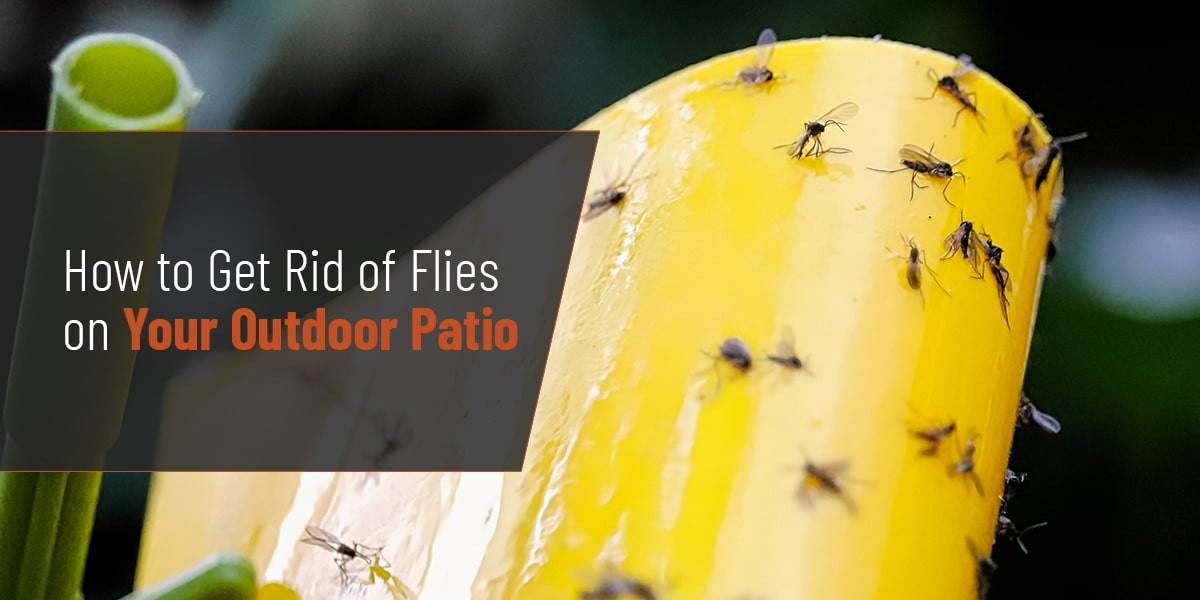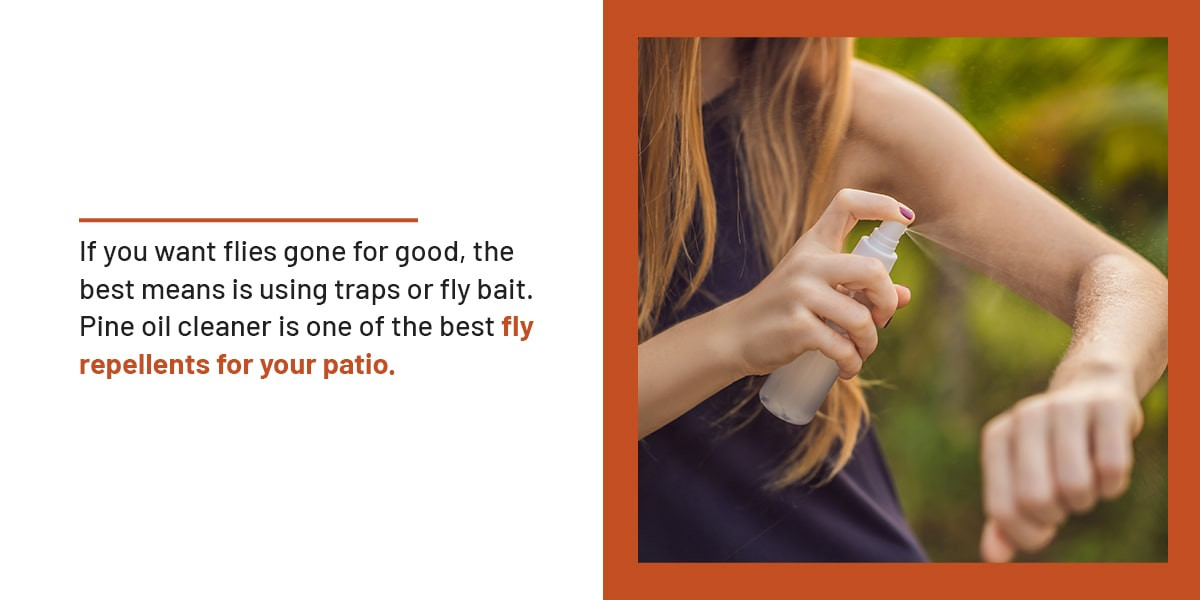Flies buzzing around your outdoor patio can quickly turn a relaxing retreat into an irritating nuisance. More than just annoying, these pests can be unhygienic, landing on food and potentially spreading germs. If you’re tired of swatting away flies every time you step onto your patio, you’re in the right place. This guide will walk you through effective strategies to eliminate patio flies and keep them away, so you can fully enjoy your outdoor living space.
Simple Steps to Deter Patio Flies
Getting rid of patio flies doesn’t always require harsh chemicals or complicated solutions. Often, simple preventative measures and natural deterrents can make a significant difference. Here are some straightforward steps to start with:
Keep Your Patio Area Clean
Just like any other space, cleanliness is key to pest control. Flies are attracted to decaying organic matter, spills, and general mess. Regularly sweeping or hosing down your patio to remove food crumbs, sticky spills, and dirt can significantly reduce fly attraction. Pay special attention to areas under tables and chairs where debris might accumulate.
Manage Food Waste Properly
Food is a major attractant for flies. When eating outdoors, especially during barbecues or picnics, take proactive steps to manage food waste:
- Cover Food: Invest in mesh food covers or domes to keep dishes protected while serving. This prevents flies from landing on your food and also keeps other pests away.
- Promptly Clear Dishes: Don’t leave dirty dishes sitting out on your patio for extended periods. Clear plates, glasses, and utensils as soon as meals are finished.
- Wipe Spills Immediately: Clean up any food or drink spills right away. Sweet drinks and sugary foods are particularly attractive to flies.
 Mesh food covers protecting food on a patio table, demonstrating a practical way to keep flies away during outdoor meals.
Mesh food covers protecting food on a patio table, demonstrating a practical way to keep flies away during outdoor meals.
Pet Waste Management
If you have pets, especially dogs, promptly cleaning up pet waste is crucial for fly control. Flies are drawn to the strong odors of animal feces. Make it a daily habit to:
- Pick Up Waste Immediately: Use pet waste bags to collect droppings right after your pet eliminates in the yard or patio area.
- Dispose Properly: Seal pet waste bags tightly and dispose of them in a garbage can with a secure lid. Avoid leaving bags of pet waste sitting in open bins or on the patio.
Secure Trash and Compost Bins
Trash cans and compost bins, especially those containing food scraps, are prime breeding grounds for flies. To minimize fly attraction:
- Use Lidded Bins: Ensure all trash and compost bins on or near your patio have tightly fitting lids.
- Regularly Empty Bins: Don’t allow trash or compost bins to become overly full. Empty them frequently and take trash to your main garbage disposal area regularly.
- Compost Smartly: If you compost, use a closed composter to contain odors and prevent fly access. For open compost piles, layer food scraps with dry materials like leaves or straw to deter flies.
Natural Fly Repellents for Your Patio
For a more natural approach to keeping flies away, consider these options:
Plant Fly-Repelling Herbs
Certain plants naturally repel flies thanks to their strong scents. Incorporating these into your patio décor can be both beautiful and functional:
- Basil: A versatile herb with a strong aroma that flies dislike. Pot basil plants and place them around your patio.
- Mint: Another fragrant herb that repels flies, as well as mosquitoes. Mint is easy to grow in containers.
- Lavender: Known for its calming scent for humans, lavender is disliked by flies and many other insects.
- Bay Laurel: This herb emits a pleasant scent that deters flies. It can be grown in pots and pruned into attractive shapes.
- Citronella Grass: Famous for its mosquito-repelling properties, citronella also works against flies. Plant citronella grass in pots or beds near your patio.
DIY Clove Pomanders
Cloves have a strong, pungent smell that flies find offensive. Making clove pomanders is a simple and natural way to repel flies:
- Create Pomanders: Take oranges or apples and stud them with whole cloves, pushing the cloves firmly into the fruit’s skin.
- Placement: Place these pomanders around your patio tables, seating areas, and any spots where flies tend to congregate. The scent of the cloves will help deter flies naturally.
Vinegar Traps (Especially for Fruit Flies)
Vinegar, particularly apple cider vinegar, is effective at attracting and trapping fruit flies. While not as effective for all types of flies, it’s a good option if fruit flies are a particular problem on your patio:
- Vinegar Trap: Fill a jar or cup with apple cider vinegar and add a few drops of dish soap. The soap breaks the surface tension of the vinegar.
- How it Works: The sweet smell of the vinegar attracts fruit flies, but once they land on the surface, the dish soap traps them, preventing them from escaping.
Advanced Fly Control Methods
If simple methods aren’t enough, or you’re dealing with a significant fly problem, consider these more direct approaches:
Fly Baits and Traps
For more aggressive fly control, commercial fly baits and traps can be very effective:
- Fly Baits: These are often insecticide-laced substances that attract flies. Flies consume the bait and are killed. Place baits strategically away from eating areas and out of reach of children and pets.
- Sticky Fly Traps: Sticky traps use adhesive surfaces to capture flies that land on them. Hang these traps in areas where flies are prevalent.
- Electric Fly Swatters and Traps: Electric fly swatters provide instant fly elimination on contact. Electric traps often use UV light to attract and then electrocute flies.
 A sticky fly trap hanging outdoors, illustrating a method for capturing and eliminating patio flies.
A sticky fly trap hanging outdoors, illustrating a method for capturing and eliminating patio flies.
Eliminate Standing Water
Flies breed in stagnant water sources. Reducing standing water around your property is crucial for preventing fly populations from growing:
- Empty Containers: Regularly empty any containers that can collect water, such as buckets, flowerpot saucers, birdbaths, and children’s toys.
- Clean Gutters: Ensure your rain gutters are clean and free of debris to prevent water buildup.
- Check for Drainage Issues: Look for areas in your yard where water might pool after rain and address drainage problems.
Light Bulb Choices
Certain types of light bulbs are more attractive to flies than others. If flies are drawn to your patio lights at night:
- Switch to Yellow Bulbs: Yellow-tinted “bug light” bulbs are less attractive to many insects, including flies, compared to standard white or blue-toned bulbs that emit UV light.
- Minimize Light Use: If possible, reduce the amount of outdoor lighting you use, especially when you’re not actively using your patio.
Citronella Candles and Incense
Citronella oil is a well-known natural insect repellent. Citronella candles and incense can create a pleasant ambiance while helping to keep flies away:
- Citronella Products: Burn citronella candles, torches, or incense sticks on your patio when you’re spending time outdoors.
- Placement: Place citronella products around the perimeter of your patio area to create a repellent barrier.
Consider a Patio Enclosure
For the most effective and long-term solution to patio flies and other pests, consider enclosing your patio. Patio enclosures create a physical barrier that keeps flies out completely, allowing you to enjoy your outdoor space without the annoyance of buzzing insects. If you’re seeking a truly pest-free patio experience, exploring patio enclosure options can be a worthwhile investment.
By combining these strategies – from simple sanitation and natural repellents to more direct control methods – you can effectively get rid of patio flies and create a more enjoyable and hygienic outdoor living space. Reclaim your patio and say goodbye to bothersome flies!